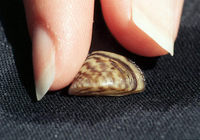| Home | About | Archives | RSS Feed |

Be on the Lookout for Invasive Species
 |
The Massachusetts Division of Fisheries and Wildlife (MassWildlife), wants boaters to know that they should "check to be sure they aren't giving a free ride to non-native aquatic plants or animals." According to MassWildlife's June newsletter, boats, motors, trailers, fishing equipment, anchors, bait buckets, live wells, swimming and diving gear, and other aquatic equipment can transport aquatic, exotic invasive species between water bodies.
Once established, invasive species can choke waterways, foul intake and discharge structures, lower lakefront property values, impede boating, swimming and fishing, and reduce biodiversity by crowding out native fish, insects, other animals and plants. After they've settled in their new homes, it's nearly impossible to eradicate them.
Last July, invasive zebra mussels were discovered in in Laurel Lake in Lee and Lenox, prompting the City of Pittsfield to coordinate a boat-ramp monitoring program, in an effort to prevent the spread of zebra mussels into its water bodies.
Zebra mussels are small 1-2" D-shaped mussels with alternating light and dark bands. They have a microscopic larval stage and can travel undetected in bait buckets, live wells and cooling water. According to Mass Wildlife, there are no known methods of control for zebra mussels once they've invaded a water body. To prevent an introduction of zebra mussels, boaters must empty all bait buckets, live wells and cooling water on dry land away from the shore.
This year, the state's Department of Conservation and Recreation (DCR) wants to make boaters aware of new procedures that must be followed for any watercraft to be launched at Berkshire waterbodies determined to be at high or moderate risk for zebra mussel colonization. Anyone launching watercraft at Ashmere Lake, Cheshire Reservoir, Housatonic River, Lake Buel, Lake Garfield, Lake Mansfield, Laurel Lake, Onota Lake, Plunkett Reservoir, Pontoosuc Lake, Prospect Lake, Richmond Pond, Shaw Pond, and Stockbridge Bowl must fill out a Clean Boat Certification Form. The form is available at the boat ramp kiosks, or you can find it here.
For more information on preventing the spread of invasive non-native plants and other organisms, click here.
If you see a zebra mussel in a Massachusetts waterway, report it to Tom Flannery at tom.flannery@state.ma.us, call 617- 626-1250 or visit www.mass.gov/lakesandponds for fact sheets. DCR is seeking volunteers for its Weed Watchers Program; more information can be found here.
(Launching requirements are different in central Massachusetts; click here to find out more or call the Quabbin Visitors Center at 413- 323-7221).
| Tags: invasive species, zebra mussels |

